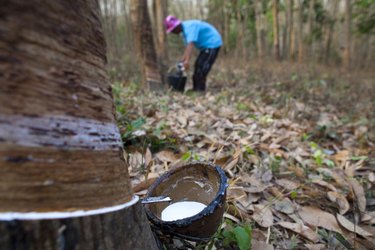
Casting resin is a highly viscous compound that hardens over time, most commonly within a mold. Homemade casting resins can be obtained from plants or trees. These homemade options won't solidify as quickly as synthetic resins.
History
Video of the Day
Humans have used natural resin, such as pine sap and amber, for thousands of years. Most resins react more quickly with a catalyst triggering the hardening process. The majority of the resins found on the market today are synthetic, as they can sometimes harden in seconds instead of hours or days.
Video of the Day
Natural Vs. Synthetic
Natural casting resins can sometimes be volatile and flammable and should only be used by someone adept in identifying safe natural alternatives. Synthetic casting resins are often made with a natural component but are less expensive and much safer to handle in various environments.
Common Uses
Casting resins are primarily used in molds to form anything from jewelry to plastic containers. Other uses of resins with different hardening points are paint, varnish, inks and perfumes.